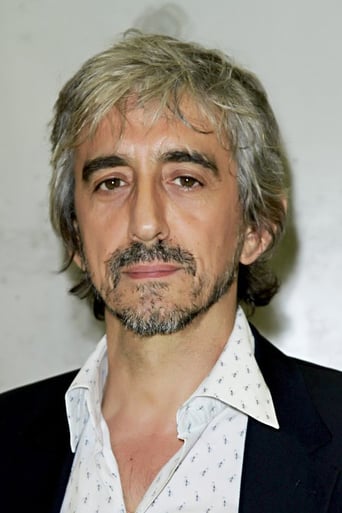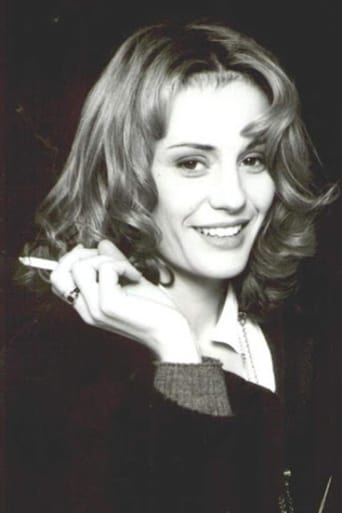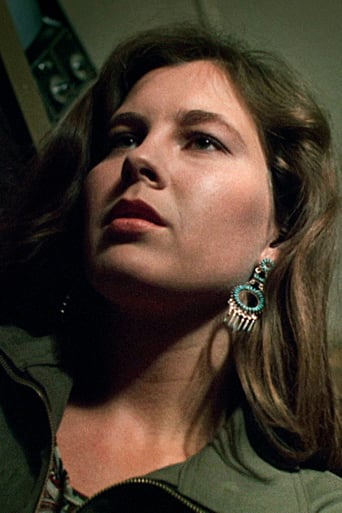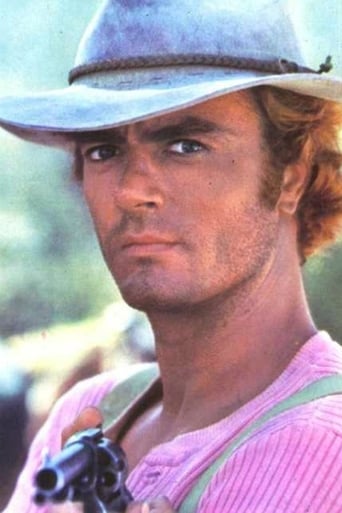Reptileenbu
Did you people see the same film I saw?
Ogosmith
Each character in this movie — down to the smallest one — is an individual rather than a type, prone to spontaneous changes of mood and sometimes amusing outbursts of pettiness or ill humor.
Phillipa
Strong acting helps the film overcome an uncertain premise and create characters that hold our attention absolutely.
Rodrigo Amaro
"Intervista" ("Interview") takes life and movies to an unimagined extent. An nostalgic journey into memory, experiences and life in the way Federico Fellini sees them. And he asks those kind of questions: "What's real in movies? What's real in news and documentaries?". Even more: "What's real in life?" Defying, joking, molding, constructing and deconstructing films and the human existence, Fellini challenges and fascinates viewers through four intertwined segments which echo his work, his art and his early memories when of his arrival at the famous studio Cinecittá, way before of becoming the cinematic author of "Amarcord" and "Satyricon".The movie is composed of showing the behind the scenes of a movie directed by the maestro Fellini; the movie itself (film within the film) and its long and confusing process of shooting; the interview documented by the Japanese crew who hears the director's stories that later are intercut with scenes of a young Fellini (played by the lovable Sergio Rubini) living his first experiences at Cinecittá while interviewing a impressionable film star. They're all mixed into an magical and dreamy imitation of life.But how can one distinguish what's scripted and what's real? You can't. But you can try. The reunion between Marcello Mastroianni and Anita Ekberg, 27 seven years later after "La Dolce Vita" is wonderful, almost brings tears to our eyes. But they really kept all this time without seeing each other as they say? Maybe, maybe not, very unlikely but somehow we buy this as a fact. It looks genuine, they're so thrilled and surprised with this event. They play themselves in the movie, watching the characters they played in another Fellini classic, when they were very young. That's the film's magic, to capture both these stars in different situations and periods of life, all captured in a beautiful frame where Marcello can play magic tricks and prepare a delightful and nostalgic surprise to Anita and then watch the famous sequence of the Fontana de Trevi that the two performed in 1960. This dialog between medias and time is hypnotic, mysterious and funny too. It's a perfect fusion of realities, facts and fiction friendly put together in one single film.One of Fellini's finest and a treasure to be sought. 9/10
felixoteiza
This is a beautiful Fellini, one the most beautiful he ever made and I don't understand why is so underrated. A joy to watch from beginning to end, a visual gem, a masterpiece; one with which the master confounds the skeptics, shows he's still in top form. I don't remember any other Fellini containing such breathtaking scenes, astonishing in their exuberance and richness in color as that in the oriental set with Maharajahs and elephants or those carrying such evocative power as that of the two aging European sex symbols of the 1960s watching themselves on a white sheet, shedding a few tears and drinking to the good old times. Oh, to be young and beautiful again...(sigh). Oh, and that final sequence of the cast and crew huddling inside the plastic tent during a storm, the collective soul going from joy and euphoric enthusiasm to muted, thoughtful melancholy, while bathed all with the music coming from the back of the truck under the rain. There's also something surreal about that haunting scene, under the rain, behind the rain, that makes it stay with us for a long time, forever: the girl blowing it away in her saxophone and the boy taking it away at the piano, both framed by the big box of the vehicle; a beautiful portrait of ineffable energy and youthful poetry. Oh, and also nobody, nobody but Fellini himself could have done a better job playing The Maestro at his best, with the juices of creativity pouring through each one of his pores.This is Fellini at his best, the full essence of his genius distilled in a single cinematographic piece, where he reaches his own outer limits. For one thing, I noticed here a great number of scenes with deep, ample backgrounds--even in some interiors--except for those where such a thing was impossible--the inside the trailer of the diva for ex.. But you will rarely see here characters in closed, claustrophobic quarters or plastered against a wall. I'm not a film scholar or a psychologist, but to me that means that at this point Fellini had finally become master of his space, that he totally owned his surroundings. He was free at last to do pure cinematographic art without being burdened by ghosts from the remote past, by the heavy load of unsolved traumas; he had finally exorcised his demons—even the resident fascist here is a nice, inoffensive little old man—and so become the filmmaker he always wanted to be. It is in this film where the master has reached his peak. Intervista is a cinematographic gem from beginning to end. The pacing, the acting, the score are impeccable, flawless; so much so, you find hard to believe that any of this could have been prepared, scripted, rehearsed as any regular movie, it feels so spontaneous, so authentic.This is a movie that Fellini had absolutely to make. He owed that to the world, his legacy wouldn't have been complete without it. The world can do without 8 ½ but it absolutely needs Intervista. And Fellini was one of the few chosen who could accomplish such a feat--the only other one I can think of being Buñuel. Because here we see the real man, Fellini in all his humility and humanity, a man in love with movies and people. I have seen enough movie shootings in public places to know that this can be at times a very stressful activity and tempers tend to flare during difficult times but I don't have any doubt that the joy and enthusiasm his collaborators show working with him here is real. I can't possibly imagine Hitchcock or Kubrick getting away with the same thing and I'm even less sure we would have wanted to watch their respective "Intervistas". But Fellini not only shows us how he shoots movies, he makes us also part of his team, we become—in the flesh of the Japanese journalists, the young actors, the crew—part of his family. Already in the introductory shot he makes clear we are his invites in that metaphoric opening wide of the gates of Cinecitta and in the fact that he's himself the one to greet us, no some subordinate or studio bureaucrat. That's enough to reassure us that what we'll get during the next 104 min. will be the real deal.Another thing I loved about Intervista is that it is a movie that doesn't take itself seriously, probably to the image of his creator. There are some hilarious moments that can only be seen as his ironic or sarcastic comments about movie directors in general or even himself: For ex., the director who won't settle for anything less than a pear for lunch. Or the other one who suffers a meltdown when a cardboard cut elephant drops its trunk. I found also the commercials very good and very tasty, said to have been Fellini's concepts. And finally, the score, a put pourri of some scores of other Fellini's films, the kind of music you'll like to be the last thing you hear when leaving this world.In all, perhaps not the best but certainly the most beautiful, most joyful, of all Fellini's. 9/10.
TheLittleSongbird
For me, it does fall short of Fellini's most classic movies like Nights of Cabiria, La Dolce Vita, 8 1/2, Amarcord and La Strada. But it is one of Fellini's better later films along with Ginger and Fred and When the Ship Sails On, and I connected more to Intervista than other Fellini's like Casanova, Juliet of the Spirits and especially Satyricon. Intervista is superbly directed by Fellini, restrained yet insightful, and the visuals are gorgeous. The music is brightly characterful and sweepingly beautiful, and the basic story is very interesting in its balance of past and present blurring, studio reality and cinematic illusion as well as being packed with numerous jewels of the screen. It is also one of Fellini's most personal in its nostalgic themes, and balance of humour, surrealism, restless action and beauty. But what makes it especially so is the poignant climax, a beautifully staged reunion between La Dolce Vita stars Marcello Mastroianni and Anita Ekberg. Overall, I knew right from the title what to expect, and I got exactly what was promised from the title and summary. Not one of the classics of Fellini, but underrated and interesting. 9/10 Bethany Cox
batzi8m1
So to sum it all up, Fellini seems to be saying in this film, he lived for movies. Like a long train ride as a passenger, a lover, a player, a commentator he lived through it all and had his moments. When Marcello Mastroianni says to Anita Eckberg while watching the fountain scene from La Dolce Vita with the party at her mansion that for one moment they made magic, it seemed to sum it all up. For the actors, the film maker and for us the audience, there were moments that were magic. This film is a great movie makers collage of his memories of his life. If it had been cinematic itself it would have taken away from the message. Life at its very best can yield a few magic moments, and those lucky enough to make those moments of magic can appreciate the rest of it all that serves as the backdrop. Like the film studio around which Fellini's life revolved and which gave him all those great memories he shared with us here.






